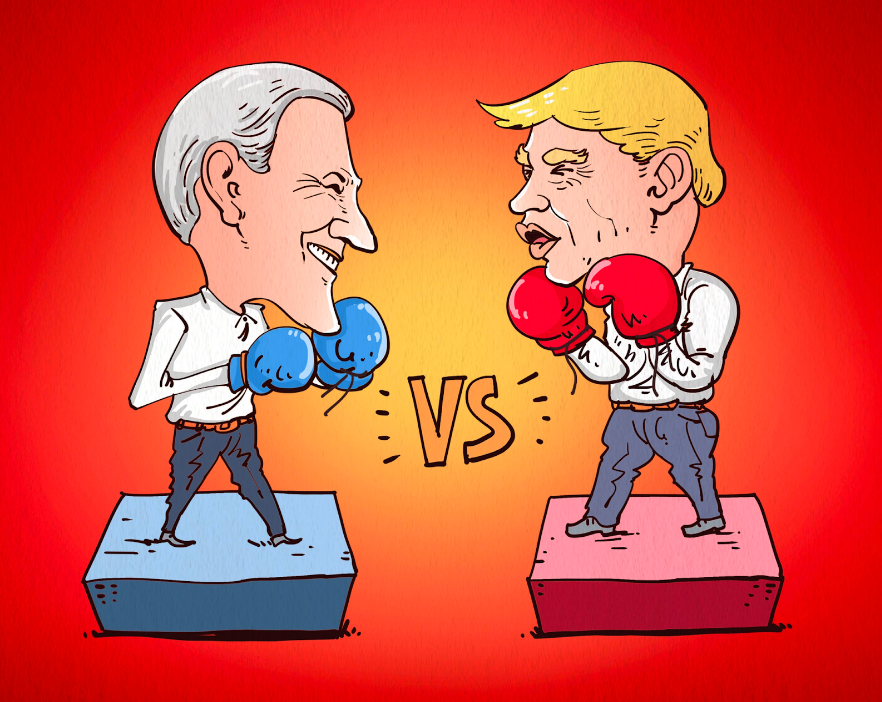By: Mirabel Ge
Donald Trump and Joe Biden’s respective campaign strategies for 2024
America holds its breath as November approaches. It is 2020 all over again—Trump versus Biden— but this time around the two candidates are all too familiar with each other.
A presidential candidate with four criminal charges and the first-ever former president indicted should be an unappealing enough prospect for most voters, right? Donald Trump’s success and popularity say otherwise. Trump owes over $540 million in legal judgment— a detriment to his finances and legal expenses. Politically speaking, however, the former president intends to lean into his criminal cases to support his campaign. The indictments open the door for Trump to portray the charges as politically motivated, an attack not on Trumps but his entire campaign. March of 2023 was Trump’s first criminal charge, and although he had previously struggled to raise cash for his campaign, the former president’s daily donation average skyrocketed from $129,000 to over $778,000 after his first court case. Trump had raised only $12 million for the first 88 days of 2023, but it took him just seven days after the first indictment to match that amount. An increase of 9% in polling averages after he had announced his expected arrest also attests to Trump’s surprising rise in support after the indictments. Over half of Republicans said that indictments and investigations against Trump were an “attack on people like them.” An investigation on Trump conducted by democrats was plenty to entice Republicans to join his side— this is the drug of partisanship that runs rife in the Republican party. A myriad of Republicans “support” Trump not because they like him as a candidate, but rather because they are dedicated to their party, and voting otherwise would feel like betrayal to both the GOP and the country.
The Trump campaign has attempted to attack President Biden’s competency to improve the country’s economy. In a CNBC appearance, Trump aimed his statement that “People are going through hell” due to inflation throughout Biden’s presidency, making a false claim that the cumulative inflation was up “over 50%” in the past few years. A CBS poll shows that 65% of Americans under Trump’s presidency were better economically in comparison to Biden. However, the two presidencies were set in vastly different climates. The pandemic was an onerous plague to the economy— something that Biden could not have anticipated or prepared for. The two economic situations do not stand on equal playfields, making it difficult to compare the two presidencies. However, Trump has capitalized off the economic woes under Biden during the pandemic, framing his presidency as more economically favorable to Americans.
While Donald Trump simultaneously tackles his multiple legal battles and prepares his campaign for November, President Biden has his problems to deal with and approach toward the presidential race. Around 6 out of 10 Americans are not confident in 81 year old Biden’s mental capability to serve effectively as president, and only 34% said that Biden was fit to serve a second term. Biden faces America’s grim expectations, so for the upcoming re-election, Biden’s campaign is banking on “tuned-out” voters; those who are not as politically involved. His campaign has prepared more intimate connections with communities. For example, in Milwaukee, Biden had an unscripted connection with a young boy about how he overcame his stutter, and the videos found their way onto TikTok, a popular social media outlet among a growing young American demographic. In Philadelphia, Biden arranged a sit-down with a small business owner to simply meet them, which generated large media coverage. Biden’s strategy employs a “virtual campaign” by showing the president’s empathetic side through the media. His campaign has a team of media to record both scripted and unscripted interactions. To guarantee that the content reaches voters, the campaign has worked with pilot programs that collect voter information. By attaching Biden’s image to a real person instead of “the president”, Biden’s campaign hopes to appeal to the pathos of the less politically aware individuals— those who will buy into the idea that Biden is a decent and down-to-earth human being without knowing the in depth plans of his presidency. Similarly to Donald Trump, Biden is playing his own game at getting under his rival’s skin. Biden has mocked Donald Trump for his indictments, being “crushed by debt” in multiple settings, and the former president’s physical health. Biden’s team says that these pointed remarks and attempts at annoying Trump will show Biden’s authenticity while nitpicking at Trump’s shortcomings. To Americans, the 2024 election is a replay of 2020. To the two candidates, it is a battle of whose campaign will prevail, with both candidates coming back more informed and stronger than in 2020. Trump takes an aggressive approach, leveraging his legal struggles to raise money for the campaign. Donald Trump’s vindictiveness as a politician is an inveterate truth— one that simultaneously makes him a mystery. His history should have easily proven him unfit to be a president, yet his name remains on the ballot, waiting to be selected by millions of Americans. Biden employs a more sympathetic approach—trying to reach the hearts of Americans to convince them of his authenticity. This sounds like the classic case of good versus evil. In theory good should prevail. Yet still, the polls, now neck and neck, prove that both campaigns are working equally well. Realistically, the 2024 presidential race has been a disappointment for many. On the one hand, another Trump term could mean chaos. The alternative is equally unpromising— Biden’s health has been a concern of many, and another term might just exacerbate his incompetence as president.



